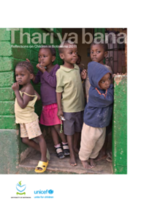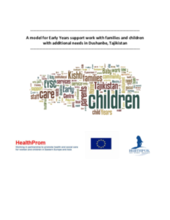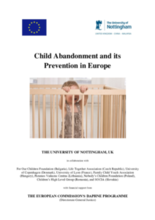Displaying 401 - 410 of 490
Virginia Commonwealth University Professors, Karen Smith Rotabi and Rosemary Farmer, examine impact of neglect on brain development in their recent podcast, Orphaned and Vulnerable Children and Brain Development. Through the persepective of the intersection of neuroscience and social welfare practice, Farmer and Rotabi examine how poverty of experience and such potential adverse situations as institutionalization disrupt brain development in babies and young children.
Collection of research and reflections on children’s issues in Botswana articles in the various chapters of the publication have been structured to follow the life cycle of the child as she or he grows and is faced with different issues that need to be addressed: young child survival; child development; child protection; HIV and AIDS; and child-sensitive social protection.
This study used the National Survey of Child and Adolescent Well-being (NSCAW, long term foster care general sample) data set to examine foster child and caregiver characteristics, and the caregiver–child relationship as a predictor of placement stability.
This report is the result 4 of a two-year EU funded project “An Early Years Support Centre (EYSC) service in Dushanbe: Reducing poverty, empowering vulnerable families, strengthening partnerships and advocating for rights”. It outlines the model of support that was developed through the EYSC project in Dushanbe, the capital of Tajikistan.
The Essential Package (EP) is a comprehensive set of tools and guides for policy makers, program managers and service providers to address the unique needs and competencies of young children, particularly those affected or infected by HIV/AIDS, in an integrated and holistic way. The work that has been conducted to date encourages service providers to consider the holistic needs of children according to their ages and stage of development as well as cultural context and resources available within their community.
This article briefly summarizes the literature on elements of research, practice, and policy pertaining to the development and care of children raised in institutions. It covers such children’s development while they reside in institutions and after their transition to adoptive or foster families.
This comprehensive manual provides an overview of child abandonment and its prevention in Europe, exploring the extent of child abandonment, possible reasons behind this phenomenon, the consequences of abandonment, and good practices in terms of prevention. For the purposes of the EU Daphne-funded project, child abandonment is defined in two ways, namely open and secret abandonment. Country specific in-depth reviews of child abandonment and its prevention are provided for 10 countries and results from an EU-wide survey analyzed.
Children within institutional care settings experience significant global growth suppression, which is more profound in children with a higher baseline risk of growth impairment (e.g., low birth weight [LBW] infants and children exposed to alcohol in utero), according to this chapter from Monographs of the Society for Research in Child Development Volume 76, Issue 4.
This chapter of Monographs of the Society for Research in Child Development Volume 76, Issue 4 is devoted to the analysis of the ill effects of early institutional experiences on resident children's development.
This chapter from Monographs of the Society for Research in Child Development Volume 76, Issue 4 reviews the neurobiological literature on early institutionalization that may account for the psychological and neurological sequelae discussed in other chapters in this volume.




